Epic Road Trips
Mountainous terrain, national highways and winding, narrow roads itched on rocks, precarious at every bend and the reward of gorgeous views of valleys and distant mountain peaks attract travellers. Welcome to the east of Sikkim. What was once the remains of the old silk road transiting from Tibet to India is now a bucket list for bikers and 4×4 enthusiasts.
The hamlet of Dzuluk (or Zuluk) at 2,900 meters is surrounded by wild forests, home to deer, Himalayan bear and red panda. It is here that we find the three-level switchback roads (Kalimpong – Zuluk Route) with about 45 hairpin bends, possibly one of the most scenic drives in India. The entire route is 90 kilometres in length with an elevation of 1,800 meters. The views overlook the terrain and plains of Sikkim and West Bengal with the Teesta River meandering down, forming a path of its own.
Zuluk could be one of your bases to explore the higher altitude jewels such as Nathang Valley, Kupup and Tsongmo lake.
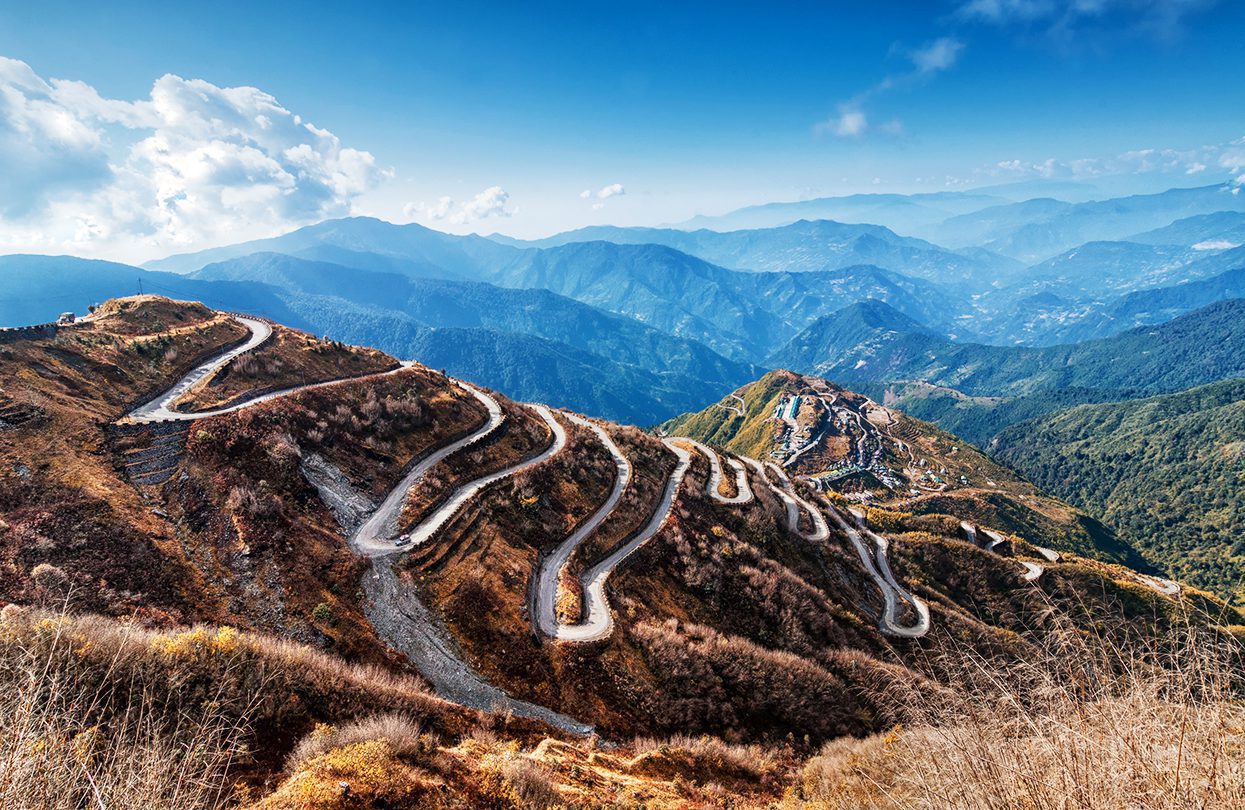
Roads on Old Silk Route, Sikkim, image by Rudra Narayan Mitra
Buddhist Monasteries
Buddhism can be found in every corner of Sikkim with 75 Buddhist monasteries, the oldest dating back to 1700s. This is the land filled with tales and teachings of lamas, age-old monasteries, colourful murals hiding behind walls and simple living. Namchi (or Namtse) is the capital of district South Sikkim and home to the Namchi Monastery and Ralang Monastery.
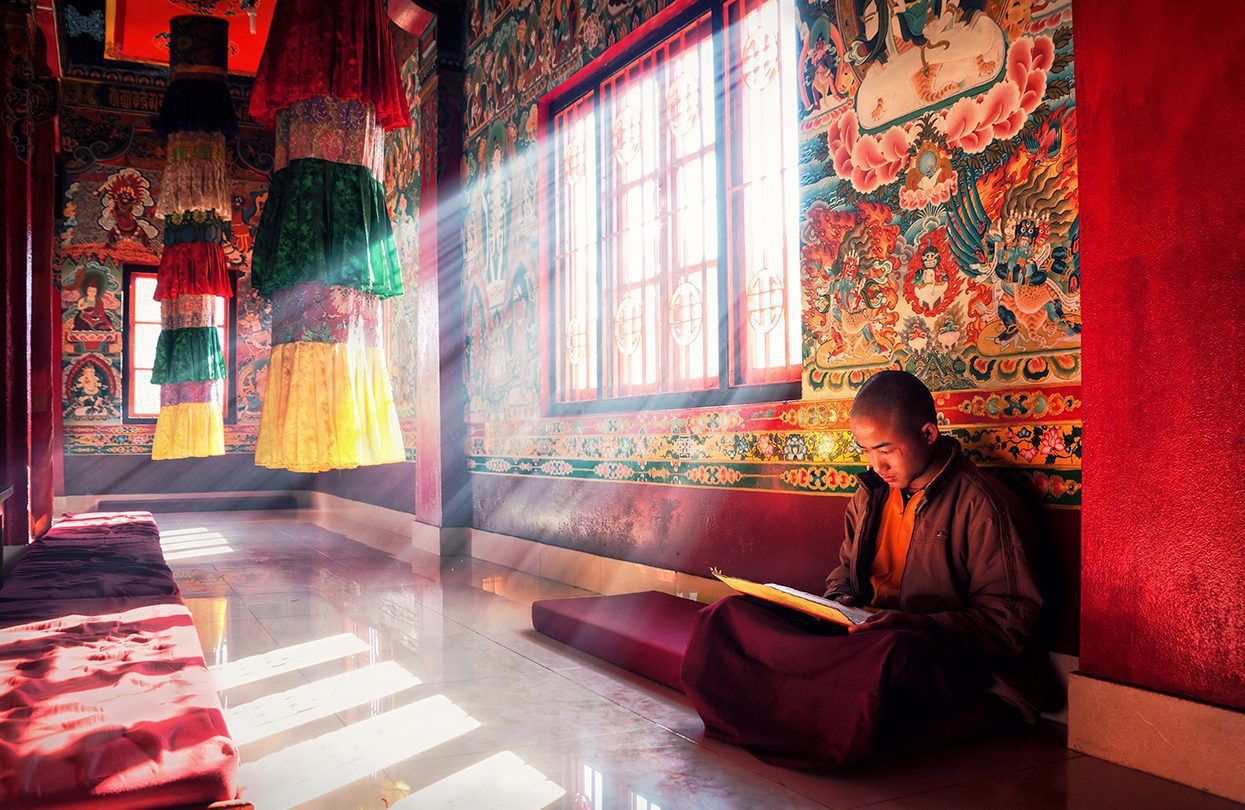
Buddhist monastery in Namchi, the State of Sikkim, image by Yury Birukov
Glacial Lakes at 3,700 m
Frozen in winter and a blue mirror surrounded by a riot of blue and yellow poppies during summer, the Tsomgo Lake (also known as Tsongmo Lake or Changu Lake) mountain paradise feeds from the melting snow resting on an ancient alpine mountain range. With a depth ranging from 5 m to 15 m covering 60 acres, this large water body surrounded by soaring peaks makes for a dramatic selfie backdrop. The revered oval-shaped lake can be found 40km from Gangtok, in the East Sikkim district.
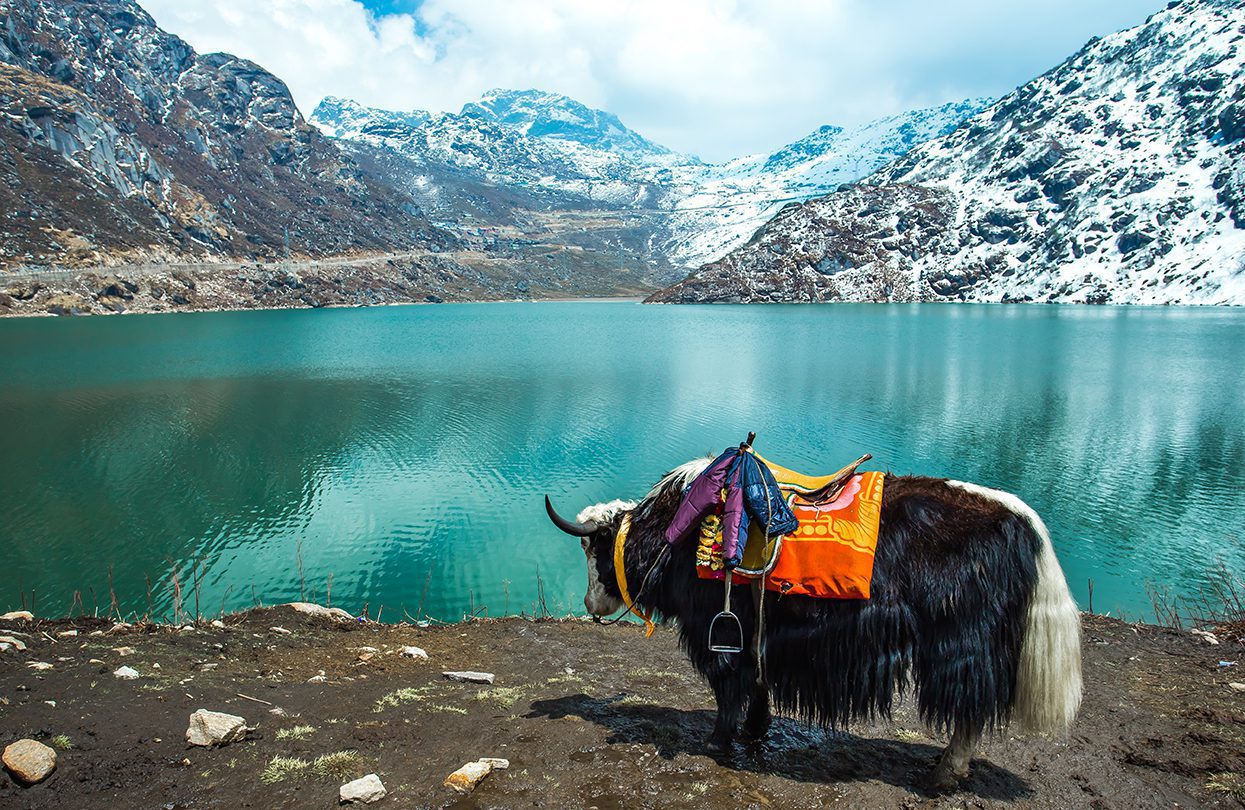
Tsongmo Lake in Sikkim, image by Nattee Chalermtiragool
Cultural parks
The Buddha Park of Ravangla, (also Tathagata Tsal) located in South Sikkim district at the base of Maenam Hill is home to the 130-foot tall statue of Lord Buddha, consecrated in 2013 by the Dalai Lama to mark the 2550th anniversary of the birth of Gautama Buddha. The complex also includes the centuries-old Rabong Monastery. While here, trek down to the sacred cave “Shar Chok Bephu”, one of the holiest caves in Sikkim.
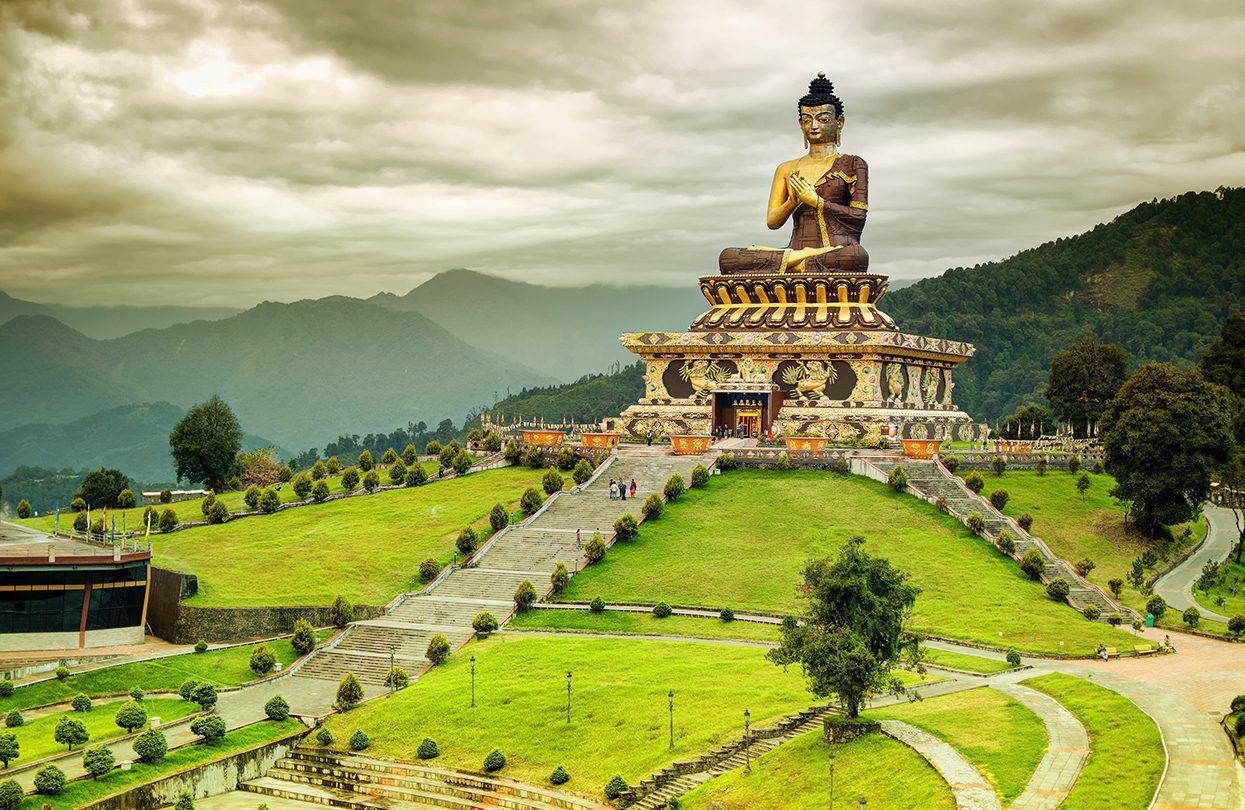
Beautiful statue of Lord Buddha, at Ravangla, Sikkim, image by Rudra Narayan Mitra
Forest bathing & trekking along passes
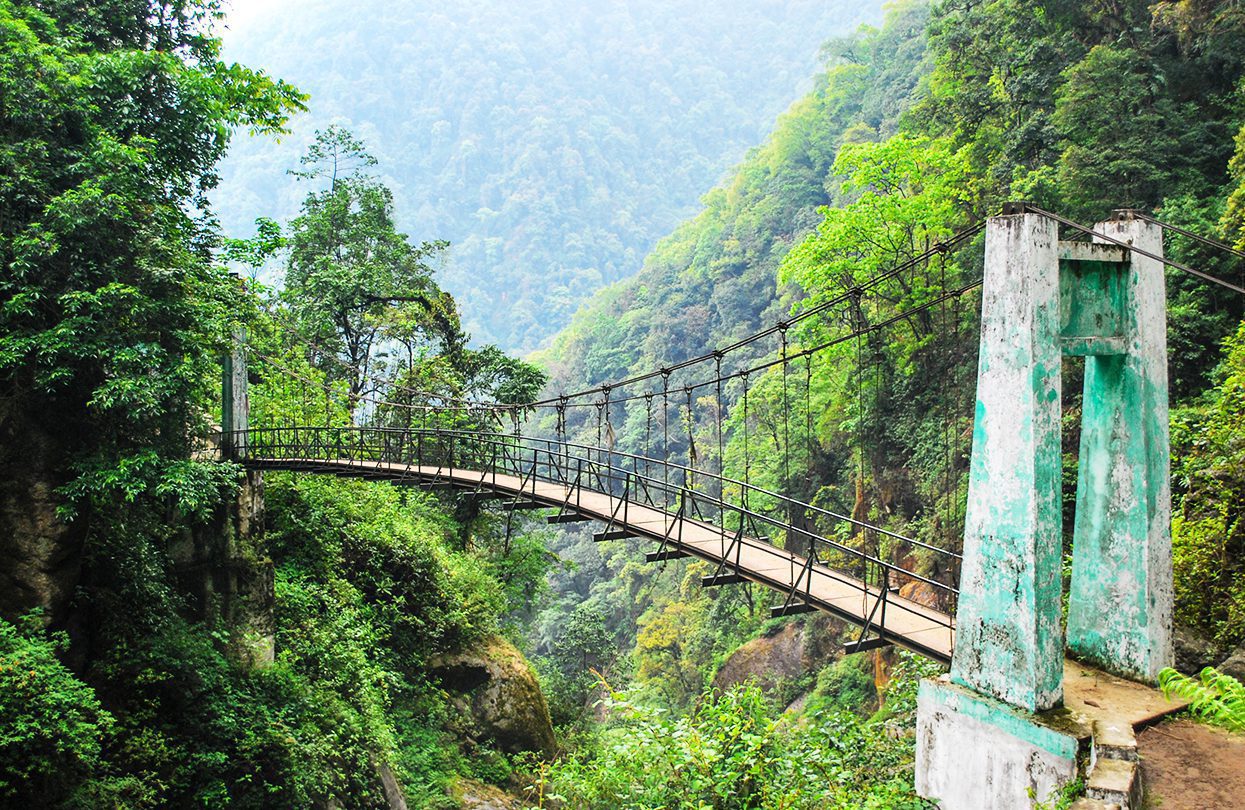
Suspension bridge in the forest at Goche-la pass trek, Sikkim, image by ShuHo
Simple pleasures in life can be the most rewarding. Trekking along the passes that lead up to the Himalayas is energising and visually stunning. The Kanchenjunga National Park, a biosphere reserve, is located in North Sikkim and is home to Mount Kanchenjunga, the third-highest peak (8,586 meters) in the world. The elevation in the park ranges from 1,829 meters to over 8,550 meters.
Among the many trekking routes, the Bakim – Dzongri – Thangshing – Samuteng – Goecha la is popular and ranges from medium to tough. On this trek, one has front row seat to Kanchenjunga ( 8586m ), Talung ( 7349m ), Rathong ( 6679m ), Kabru N ( 7353m ), Koktang ( 6147m ), Simvo ( 6812m ), Kabru S ( 7318m ), Kabru Dome ( 6600m ), Kabru Forked ( 6100m ), Pandim ( 6691m ), Tenchenkhang ( 6010m ) and Jupono ( 5650m ) mountain peaks.
This pristine stretch of land is home to the musk deer, snow leopard, the endangered Himalayan tahr, red panda, Himalayan blue sheep and takin. This high altitude trek takes one through a mixed forest of oaks, fir, birch, maple and willow.
Gangtok, a mountain city
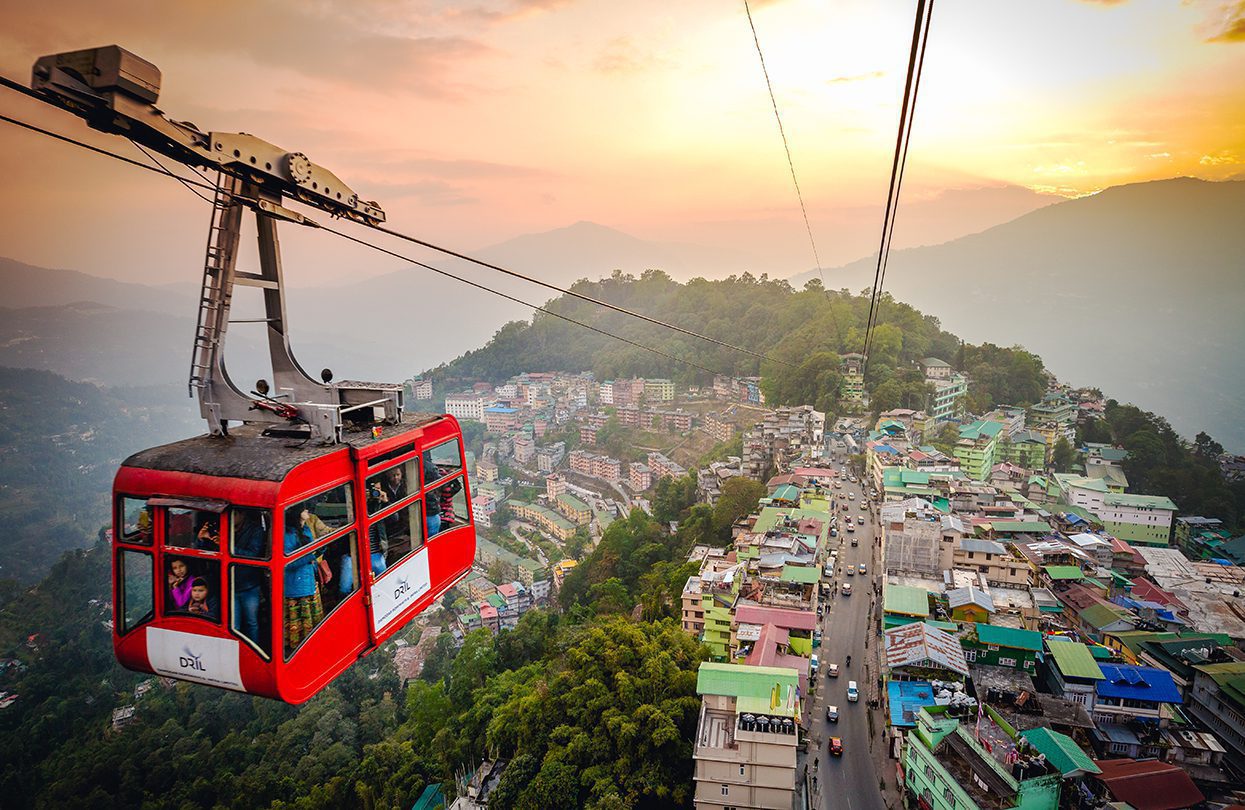
Tourists enjoy a ropeway Gondola ride over Gangtok city during sunset, Sikkim, image by Vivek BR
Gangtok, the capital of Sikkim, is perched at 1,650 m with views of the high Himalayan peaks. The city is an ideal base to explore the region further, and getting here from any other city in India is as easy as catching a flight.
Hotels of varying appeal can be found here fairly easily; tourism being a key industry for the state. Do however take note that the word ‘luxurious’ and ‘5-star’ are stretched by local hoteliers when the general market consists of 3-star hotels at best. A bed with extra blankets, clean facilities with hot running water and a freshly cooked breakfast – this is luxury. For everything else, look at the views of the mountain range and be happy!
When in Gangtok, try the 1 km (7 minutes), 3 station gondola ride from Deorali to Tashiling, paragliding in Baliman Dara (1,400m for 5 to 10 minutes) or Reshithang village (2,200m for 20-30 minutes) and get your hands on the street food that’s a mash of Tibetan, Sikkim and Nepalese cuisine.
Catch up with a Yak
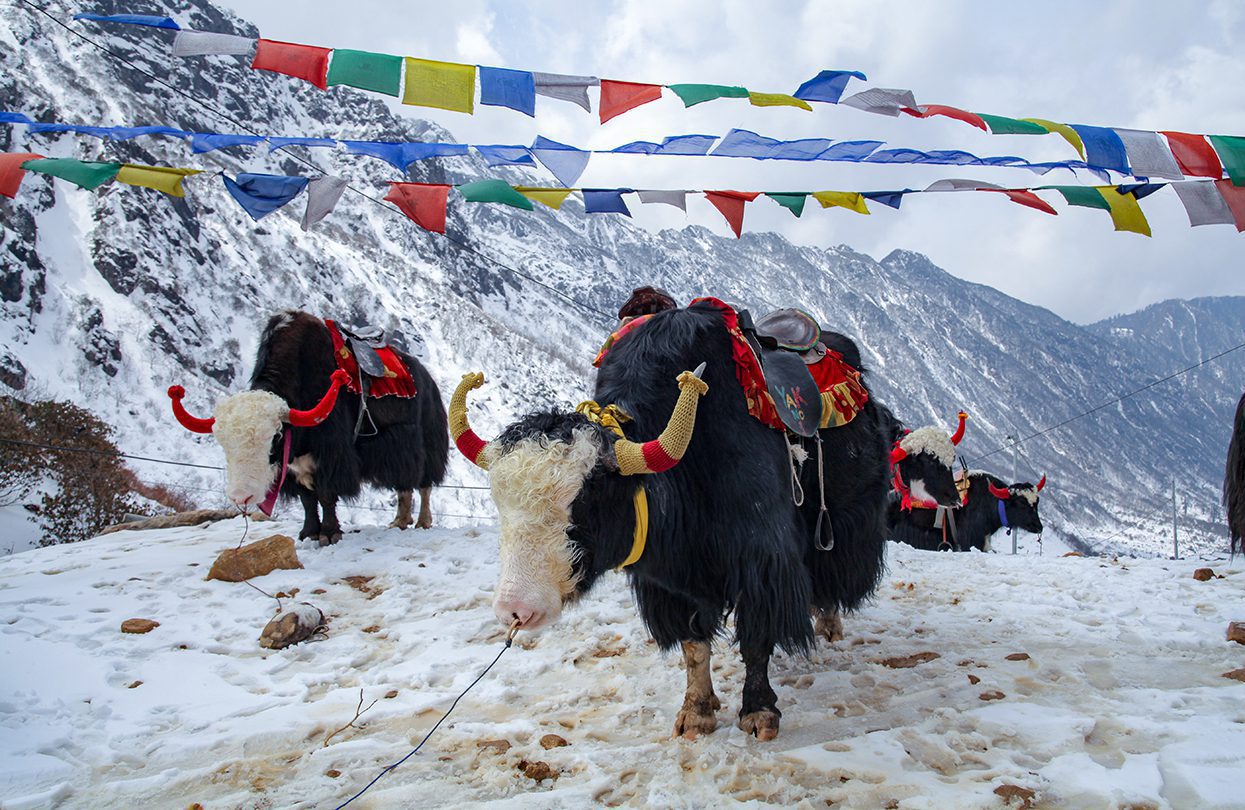
Yak at the Tsomgo (Changu) Lake in East Sikkim, a sacred natural glacial lake on top of mountain in Gangtok, image by ImagesofIndia
A few yaks here and a few yaks there keeps the kids happy for an afternoon. Ditch the jeep for a couple of days and try a different mode of transport up the mountain terrain. A 3 to 5-day yak safari along popular trails in the Dzongri area and Tsomgo lake are unique experiences – the camera in one hand and the reins and hump of the sturdy, bulky mountain animal in the other.
Walk amongst ruins of an old kingdom
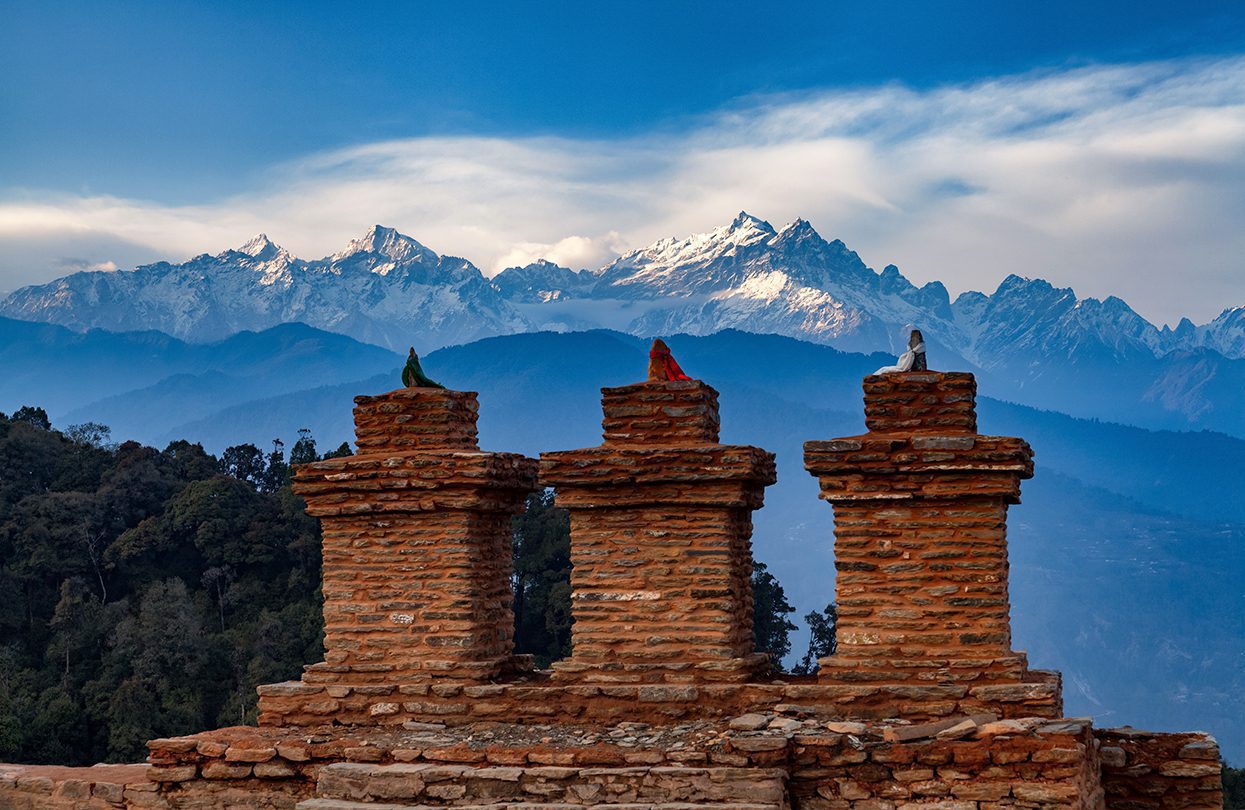
Rabdentse Ruins near Pelling, Sikkim, image by ImagesofIndia
The Kingdom of Sikkim (Dremoshong) with its 12 Buddhist monarchs between 1642 to 1975 trace their roots to Tibet. The fragile kingdom born witness to power plays, assassinations and invading armies, similar to plots that kept Europe busy for centuries; this conflict however was set on a much smaller scale. The capital of this now defunct kingdom shifted four times in its 330-year history, from Yuksom to Rabdentse to Tumlong and finally settling at Gangtok.
Over time, the second capital, Rabdentse, was reduced to ruins by the constant attacks by the Gurkha army of Nepal – leaving in its wake a shadow of rubble, stone stubs and a shattered palace. Visitors today can walk amongst the stone throne comprising of three standing stones known as ‘Namphogang’ and the ruins of the palace. The grounds present commanding views of the mountain range.
Visit tea plantations
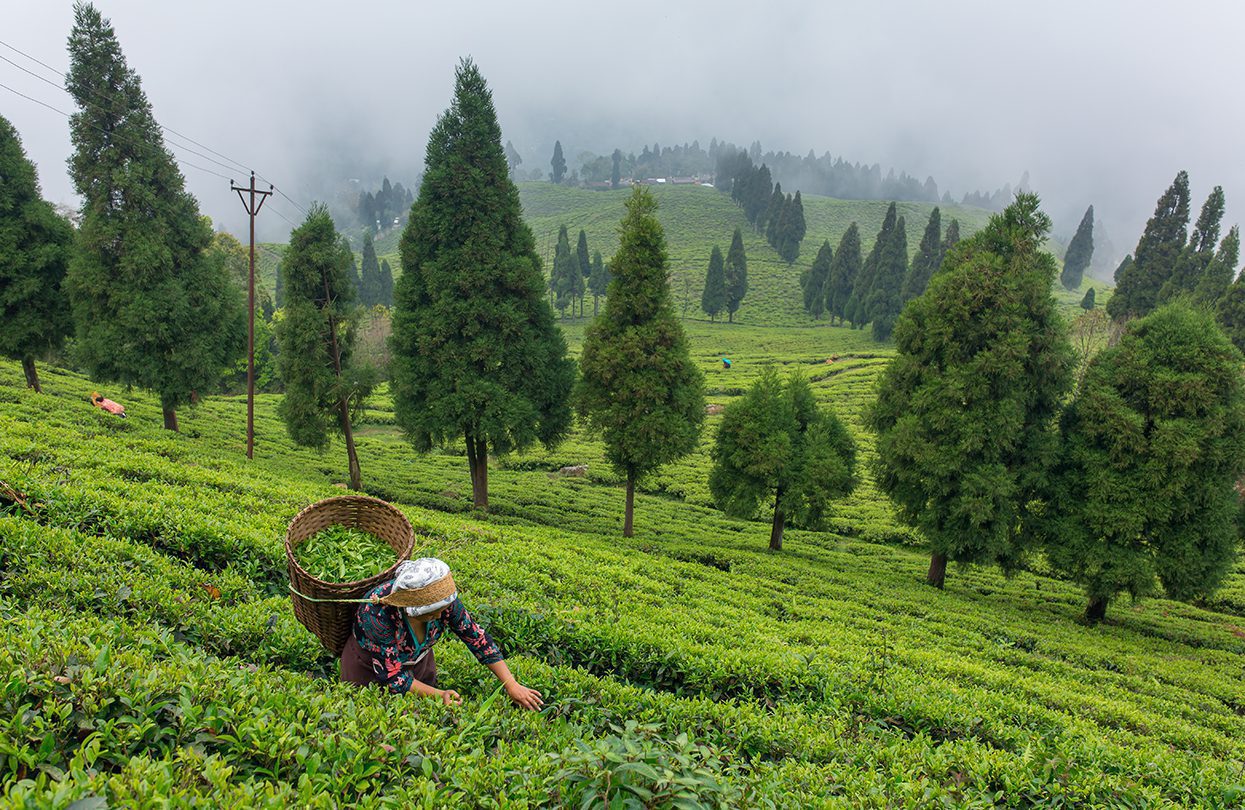
Collecting fresh tea leaves from the tea plantation near Darjeeling, image by Mazur Travel
The brew discovered by accident in 2737 B.C.E found its way through Portuguese pirates, Lebanese merchants, British royalty to the hills of Darjeeling, with large tracts of land converted into mass plantations with an intent to break someone’s monopoly on tea.
An early morning walk through a tea plantation, with cool, crisp morning air and greenery all around is invigorating and empowering. Add an 8kg bag of tea leaves on your back for a few hours a day and the definition changes quite quickly to ‘hard work’. Visit the tea plantations & estates, sample tea brewed by the experts and appreciate the back-breaking labour that goes into creating your quick go-to hot beverage.
View the roof of the world from monasteries
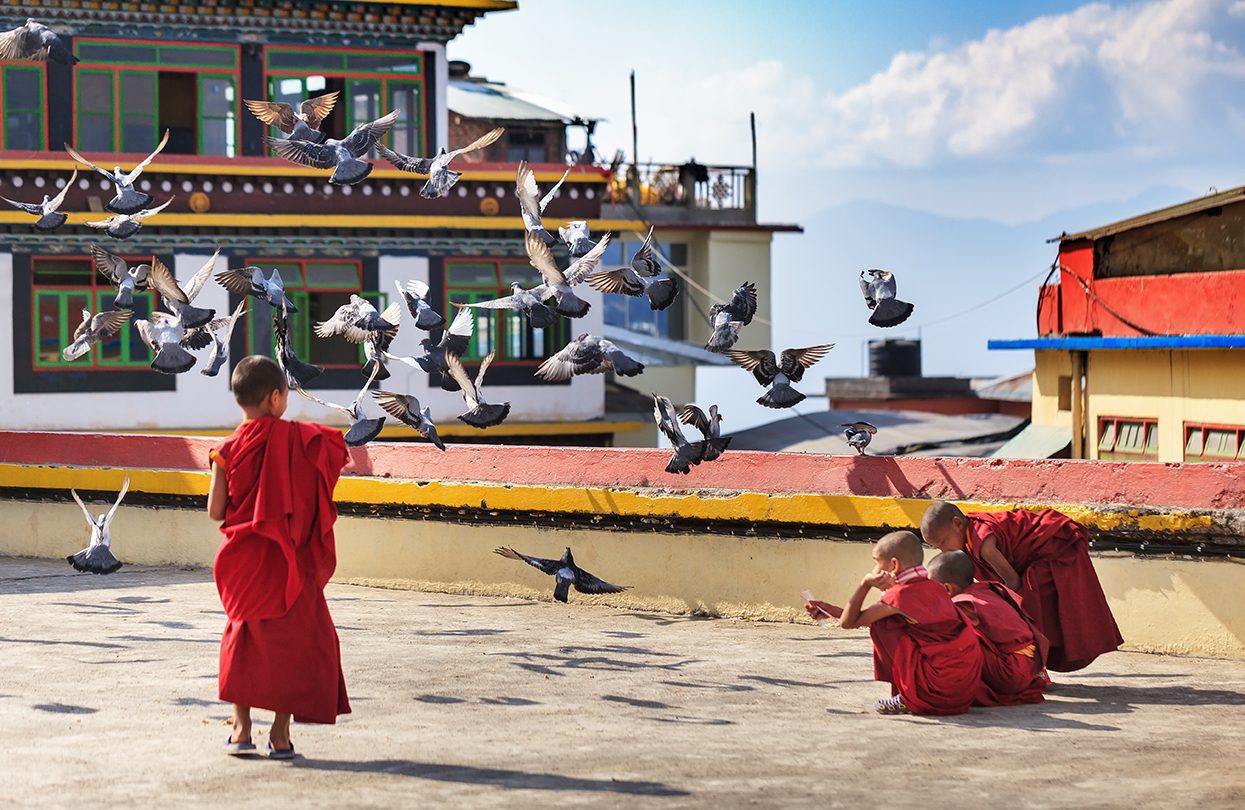
Little Buddhist monks feed pigeons on a roof of the monastic Rumtek complex, The Himalayas are visible in the distance, image by Denis Dymov
The Rumtek Monastery (also called the Dharma Chakra Centre), at an altitude of 1,500m, can be a symbol of peace – flowing streams and snow-capped mountains outside, a golden Stupa comprising the relics of the 16th Karmapa, one of the highest ranking monks, inside. The monastery was first constructed in the 16th century and rebuilt with the help of the royal family in 1959 by Rangjung Rigpe Dorje. This monastery is amongst the shortlist of most important monasteries in Asia.
Visit a sacred mountain lake
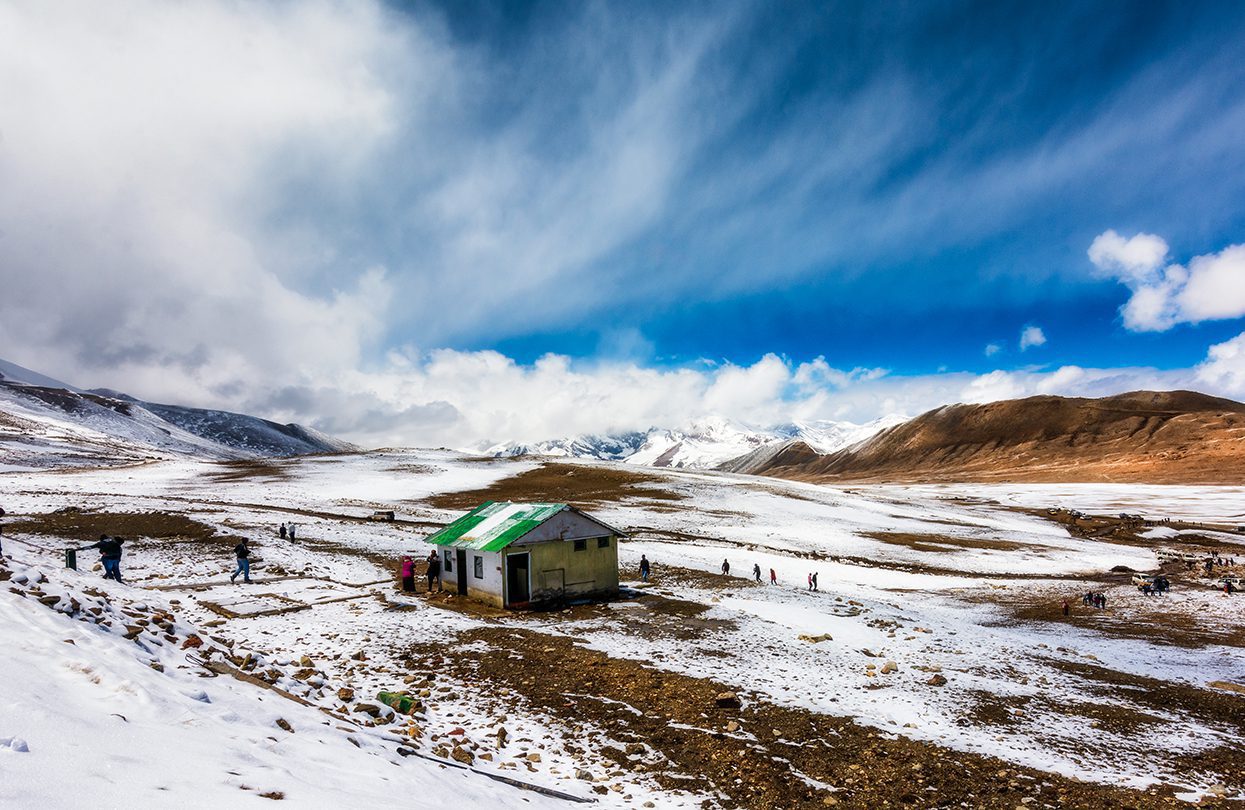
Stunning landscapes at Gurudongmar Lake, North Sikkim, image by Sudip Ray
The Gurudongmar Lake at 5,400m is a land of contrast in the Himalayas. The waterbody fed by glaciers located in the high plateau is frozen between November to mid-May and a source of life during summer. Folklore keeps the nights by the campfire entertaining and the stunning views keep the camera busy throughout the day. ◼
Subscribe to the latest edition now by clicking here.
© This article was first published online in Sept 2020 – World Travel Magazine.

